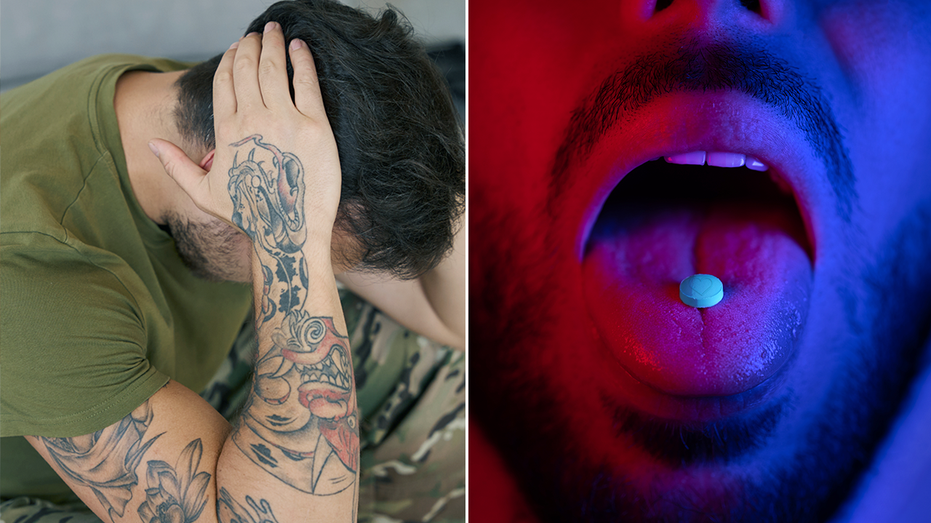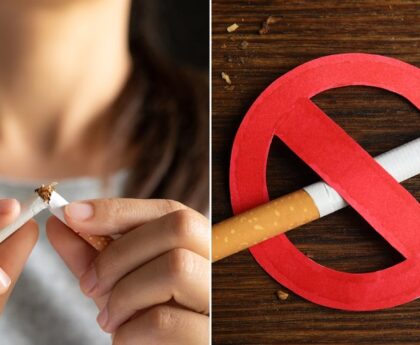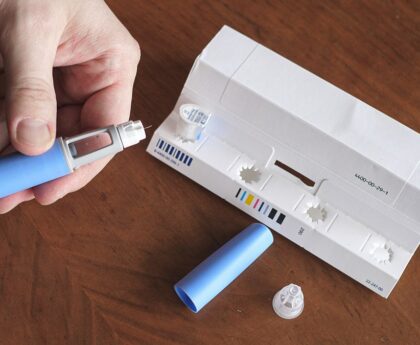This story discusses suicide. If you or someone you know is having thoughts of suicide, please contact the Suicide & Crisis Lifeline at 988 or 1-800-273-TALK (8255).
PTSD sufferers might soon have a new avenue of relief.
A drug application for psychedelic-assisted therapies has been filed by Lykos Therapeutics, formerly MAPS PBC, for FDA approval.
As of Dec. 12, 2023, the U.S. Food and Drug Administration (FDA) had 60 days to respond with its long-awaited verdict, according to a Jan. 10 news release from Lykos, which is based in California.
VETERAN HOMELESSNESS SEES LARGEST SPIKE IN 12 YEARS, VA REPORTS: ‘WE HAVE FAILED,’ LAMENTS ARMY VET
If approved, the U.S. Drug Enforcement Administration (DEA) would have to reschedule (recategorize) MDMA — also known as ecstasy — to make it legal for prescription medical use.
The Department of Veteran Affairs (VA) also announced on Jan. 5 that it’s released proposals for VA researchers to study the use of psychedelic compounds, including MDMA and psilocybin (magic mushrooms), when used in conjunction with psychotherapy to treat PTSD and depression.
The VA confirmed in an email to Fox News Digital that this research will be the first of its kind since the 1960s.
While some people have hesitations, a 16-year Marine Corps veteran, Juliana Mercer, has been a leading advocate of psychedelic-assisted therapies in treating mental health challenges.
Mercer, who lives in San Diego, is director of veteran advocacy and public policy at Healing Breakthrough, an organization aiming to get MDMA-assisted therapy adopted into the VA system.
VET WHO LOST MILITARY ‘BROTHERS’ TO POST-WAR SUICIDE CALLS FOR URGENT CHANGE: ‘WE COULD DO BETTER’
In an interview with Fox News Digital, the veteran noted that MDMA therapy has been shown to be 71% effective in eliminating PTSD in two Phase 3 clinical trials.
Mercer anticipates hearing back from the FDA “very soon” on its decision — and said she hopes the agency will green-light the drug.
“We’re fairly certain and optimistic that it will be approved,” she said. “And once that happens, there’s some more paperwork that needs to be done in anticipating MDMA to be prescribed by health care providers in mid- to late 2024.”
When contacted for comment, the FDA told Fox News Digital that it cannot discuss the existence of, or status of, any pending applications.
Mercer, who spent deployments in Iraq and Afghanistan, struggled with PTSD until it “came to a head” in 2019, she said.
SINGER GAVIN DEGRAW SURPRISES US SOLDIERS WITH RESCUE PETS THROUGH PAWS OF WAR INITIATIVE
The veteran sought talk therapy, which helped her to “not feel so alone” — but it didn’t help “tackle the problem” at its root, she noted.
After being introduced to a Florida nonprofit, Heroic Hearts Project, Mercer was able to access psychedelic therapy outside the U.S.
“After that healing that was almost overnight, in conjunction with the talk therapy that I was doing and with a psychedelic coach, I was able to get to the root cause, and also regain my joy and my love and go back to working with the veteran community,” she told Fox News Digital.
Mercer said her experience became the “catalyst” for her advocacy for therapy access, as she recently testified during a Nov. 14 hearing on Capitol Hill.
AI TECH IDENTIFIES SUICIDE RISK IN MILITARY VETERANS BEFORE IT’S TOO LATE: ‘FLIPPING THE MODEL’
She addressed the House Committee on Veterans’ Affairs about the efficacy of these therapies, claiming that the trial results “cannot be outstated.”
Mercer told Fox News Digital that she believes it is “such a huge injustice” that there “isn’t anything working” in the U.S. for struggling vets.
“I felt like I needed to shout it from the rooftops and figure out a way to get this available to my veteran brothers and sisters,” she said.
“The suicide epidemic is killing us at a rate higher than the death rate of 20 years of war,” Mercer added. “We’re losing over 6,000 veterans a year to suicide.”
In a press release discussing the rollout of psychedelic research, VA Secretary Denis McDonough wrote that America’s veterans “deserve the very best care, and VA is constantly supporting innovations to deliver that.”
He added, “This is an important step to explore the efficacy of a potential new set of promising treatments that could improve the health and quality of life for veterans.”
Dr. Shereef Elnahal, the VA’s under-secretary for health, commented in the same release that veterans and VA researchers have been vocal about the “potential promise of psychedelics to treat mental health conditions for some time.”
“Now is our chance to study this potential method of treating veterans with PTSD and major depression across the country,” he wrote.
MDMA therapy is the first of these novel treatments to be considered for FDA approval, Mercer detailed, claiming that two-thirds of patients no longer qualify for PTSD diagnosis after treatment.
Another psychedelic option is psilocybin, also known as “magic mushrooms.”
It has also shown promising results upon entering Phase 3 clinical trials.
Since the approval of psilocybin-assisted therapies could be “a few years down the road,” Mercer said MDMA’s potential approval is the “tip of the spear” when it comes to saving veterans’ lives.
MDMA medication is administered orally inside a clinic during an approximate eight-hour session, according to Mercer, with the guidance of a mental health care provider.
The patient undergoes talk therapy for a month before receiving the medication — and then for another month afterward.
The VA is looking into expanding talk therapy options beyond one-on-one sessions, to include group conversations and sessions with significant others, Mercer pointed out.
Dr. Yuval Neria, director of Columbia University’s PTSD Research and Treatment Program in New York, shared his optimism about this mode of therapy with Fox News Digital.
“Veterans with PTSD suffer from a multitude of interpersonal problems, including PTSD, depression, severe difficulties in relationships with their partners, functional impairment and suicide,” he said. “Yet there is an acute lack of effective treatments, particularly in VA settings.”
Some PTSD therapies that are considered the “gold standard” require veterans to “relive their traumas,” said Neria, which is “not preferable among many.”
“As a result, there is a high dropout rate of traditional talk therapies (36% to 68% depending on modality),” he noted.
FISHING TRIPS FOR VETERANS: NONPROFIT BOOSTS HEROES’ MENTAL HEALTH WITH ‘CALMING EXPERIENCE’
The FDA’s potential approval of MDMA-involved treatment represents a “promising step,” Neria said.
“Many veterans seek a larger ‘transcendent’ experience to counter their trauma experience,” he said. “They seek to hit the ‘reset’ button, and hope that psychedelics rapidly do that, with little effort on the veteran’s part.”
“MDMA seems to synergistically improve not only the symptoms of PTSD, but also the relational context among PTSD patients, their partners and family members, allowing sustained improvement through enhanced and strengthened relationships,” he added.
Mercer said she believes that any skepticism around the benefits of psychedelic-assisted therapies could be due to its criminalization after it broke out in the “party scene” during the 1970s and 1980s.
“Our government, instead of trying to figure out how to keep it safe or keep it in clinics, just scheduled it,” she said. “So, there’s a stigma around MDMA and psilocybin.”
(The DEA puts drugs into different categories, or schedules, to designate their “acceptable medical use or dependency potential.”)
“The tough conversations have been easier now that we have science that backs up the efficacy and safety of these types of substances,” Mercer also said.
While Mercer predicts that FDA approval could eradicate some stigma and educate the public, she encourages veterans to “do their research” before partaking in psychedelic-assisted treatments.
“Also, talk to other veterans who have undergone the process,” Mercer advised. “There are a lot of communities out there … that can help veterans navigate and answer questions.”
Dr. Marc Siegel, clinical professor of medicine at NYU Langone Medical Center and a Fox News medical contributor, recently interviewed two of the country’s top researchers on psychedelics — Dr. Rachel Yehuda, founder and director of the Center for Psychedelic Psychotherapy and Trauma Research at Mt. Sinai in New York, and Dr. Charles Marmar, director of the PTSD research program at NYU Langone.
“They agree there is therapeutic potential if very carefully studied under very strict medical guidance, but there is a huge downside in terms of unregulated recreational uses,” Siegel told Fox News Digital.
Yehuda said part of the effect could be from the out-of-body hallucinatory experience, while Marmar said the benefit is purely pharmacological and that the same impact can be gained without the high, Siegel relayed.
“Both doctors see likely therapeutic value to psychedelics if carefully managed by medical experts,” Siegel added.
“We’ve thrown so much at this problem, whether it’s helping with employment or education, recreational activities, getting them engaged with their communities – and nothing has moved the needle on this mental health care crisis,” Mercer told Fox News Digital.
As rates of veteran suicide and homelessness continue to rise, the veteran suggested that MDMA-assisted therapy could be “the light at the end of the tunnel.”
CLICK HERE TO SIGN UP FOR OUR LIFESTYLE NEWSLETTER
Mercer predicted, “I think that once we’re able to heal our veterans of their PTSD and other mental health conditions, we’ll see a drop in suicides and homelessness … and we’ll see veterans being employed and part of their communities and becoming leaders again.”
For more Lifestyle articles, visit www.foxnews.com/lifestyle.
Article Source: Health From Fox News Read More




